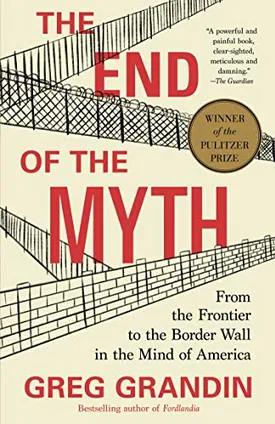The End of the Myth: From the Frontier to the Border Wall in the Mind of America by Greg Grandin
The End of the Myth: From the Frontier to the Border Wall in the Mind of America by Greg Grandin is a thought-provoking book that takes a deep dive into the history of America’s frontier myth and how it has shaped our country’s narrative. In the book, Grandin argues that since the beginning of the nation, the idea of a wild, untamed frontier has been part of the American consciousness. The idea of a cross-country journey to discover a new land was romanticized and used as a justification for adventure and exploration. This frontier also served a political purpose, unifying disparate states under a shared narrative and sense of identity.
But, as Grandin argues, this myth is now coming to an end. With the construction of a physical border wall and other restrictions on immigration, America is becoming more insular and inward-looking. The frontier spirit which inspired generations of American is being replaced by a culture of fear, exclusion, and aggression.
Grandin examines how this shift has impacted the nation — from politics to economics — and how it has shaped our national consciousness. He charts its transformation throughout the 20th century and how globalization, the proliferation of technology, and the spread of neoliberalism have created a new kind of border. This border is ideological, rather than geographical, and divides us from each other not just geographically, but also in terms of race, class, and even gender.
Grandin’s book serves as a cautionary tale and a warning of the dangers of nationalism and isolationism. He is critical of the ways in which the frontier myth has been used to cover over harsh realities — such as the displacement of Native Americans — and points to the ways in which it has been used to foster a sense of American exceptionalism. He calls out the ways in which our current policies of xenophobia and exclusion fuel racial and ethnic tensions and how our policies of mass incarceration are a continuation of this same oppressive ideology.
Ultimately, Grandin argues that in order to move toward a more equitable future, we must move away from the mythology of Manifest Destiny and instead embrace a more progressive vision of a truly inclusive and “outward-facing” America. By taking apart the myths of the frontier and border wall, Grandin offers a timely and necessary reminder that the task of nation-building is an evolving one, and that those imperfections in America’s past should not be the basis for the future. Instead, we should choose a higher road, one of dialogue and progress, in order to create a more compassionate and just society for all.

